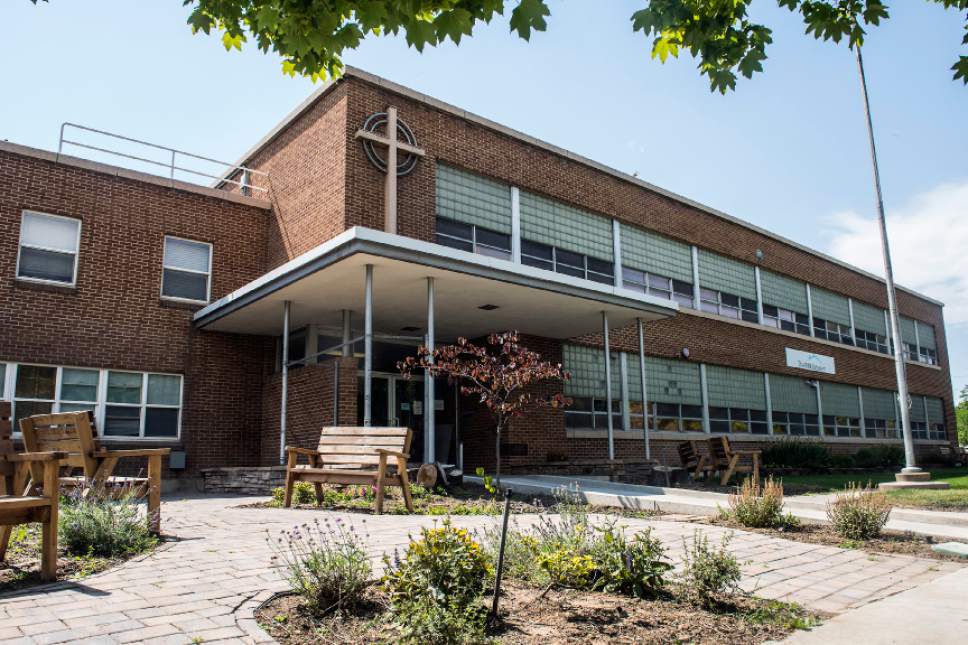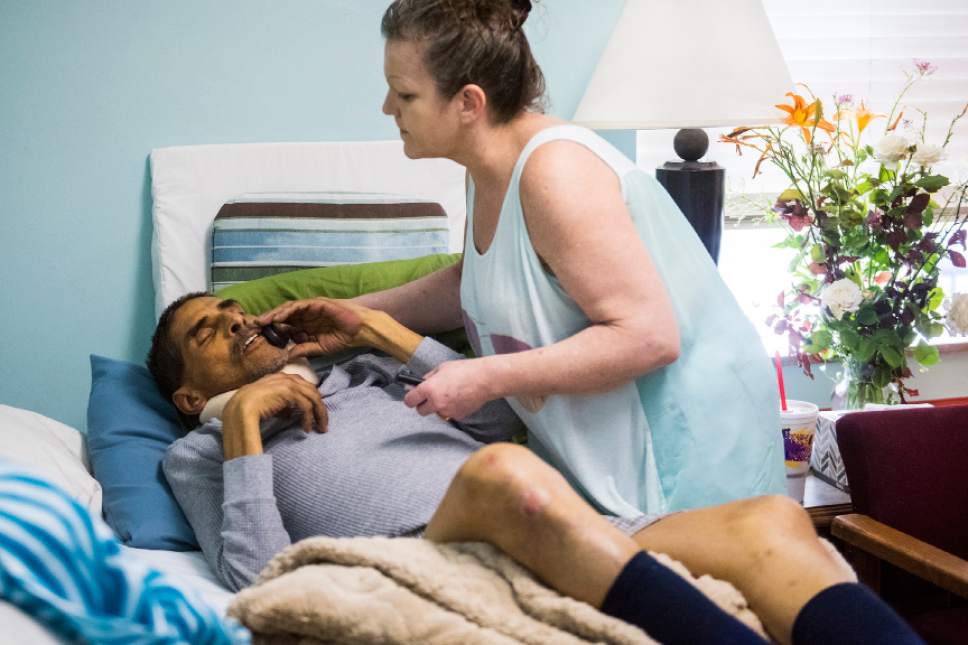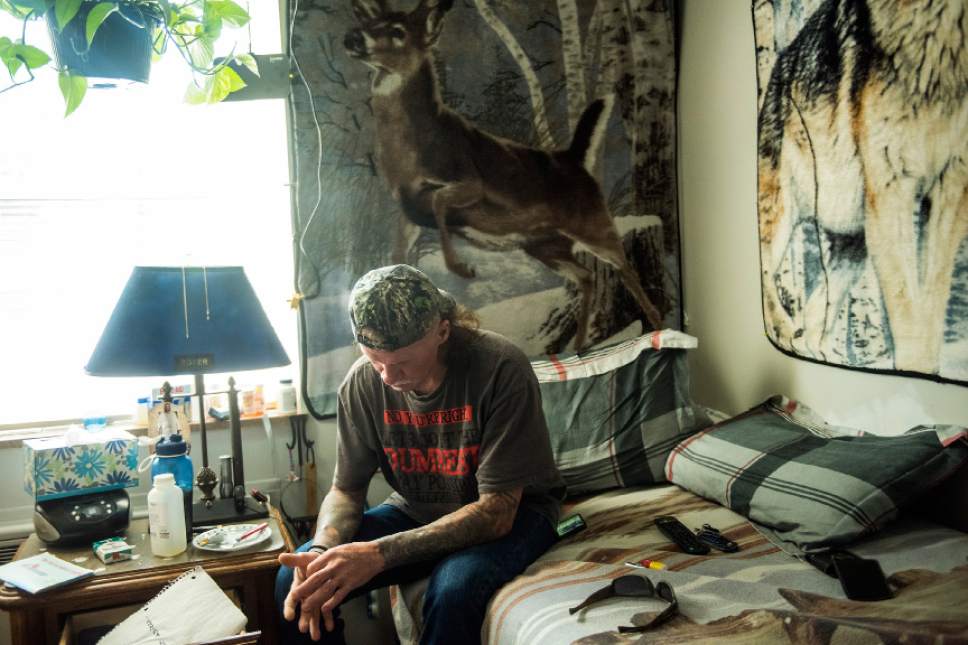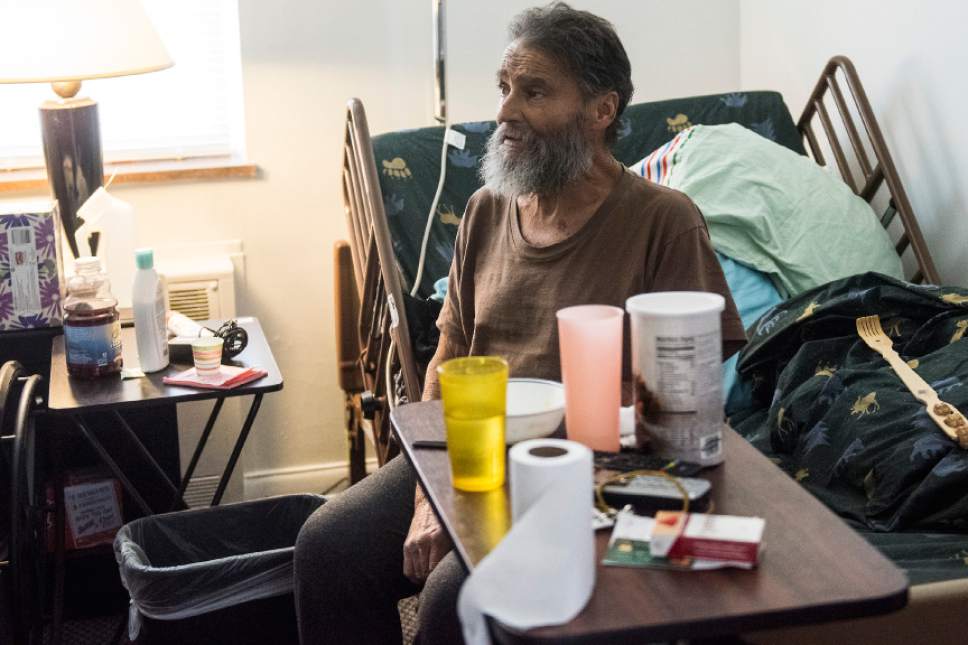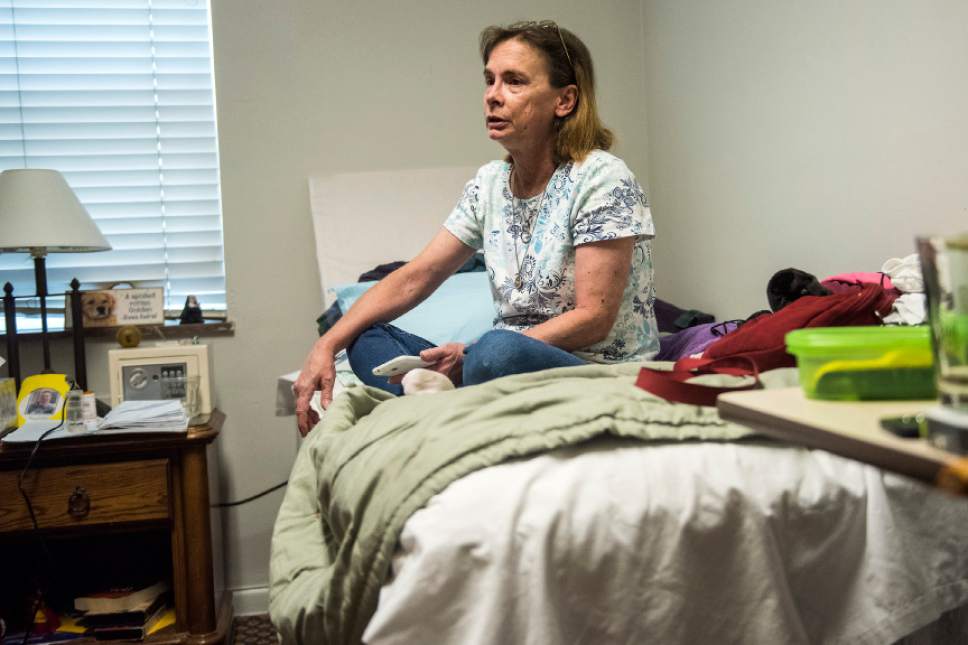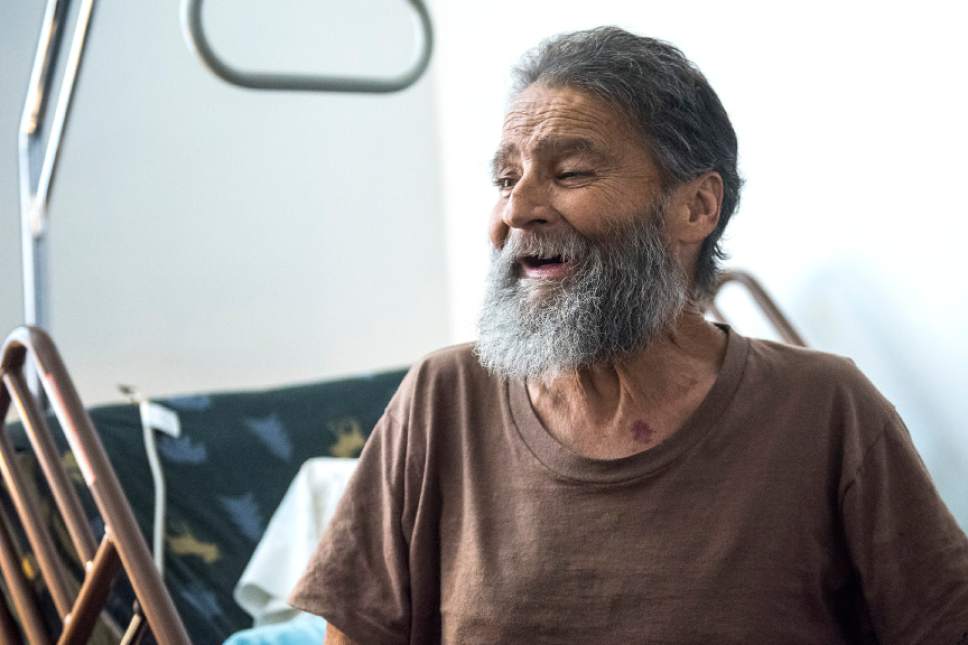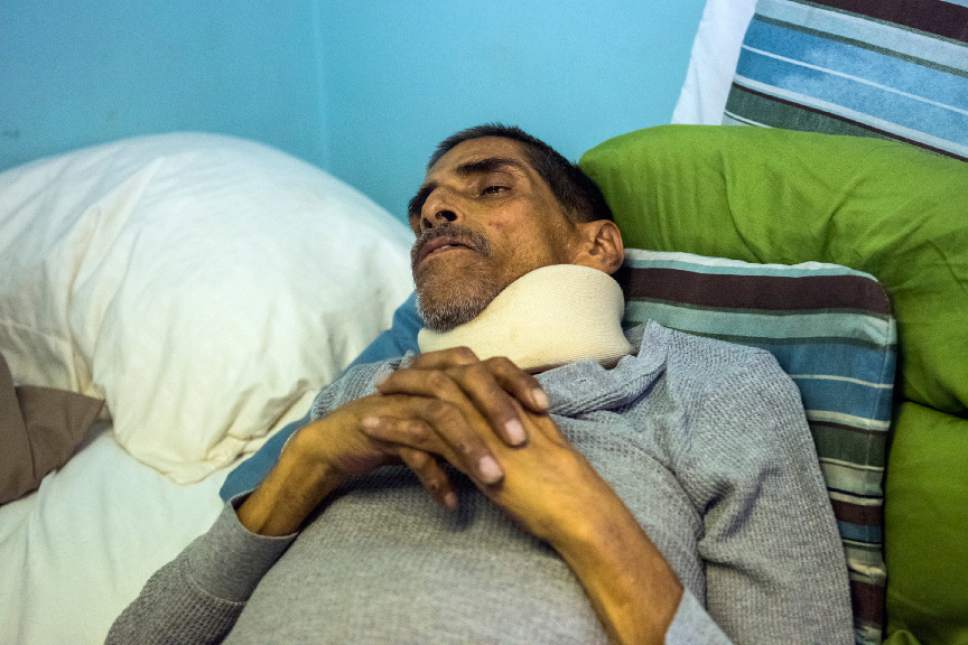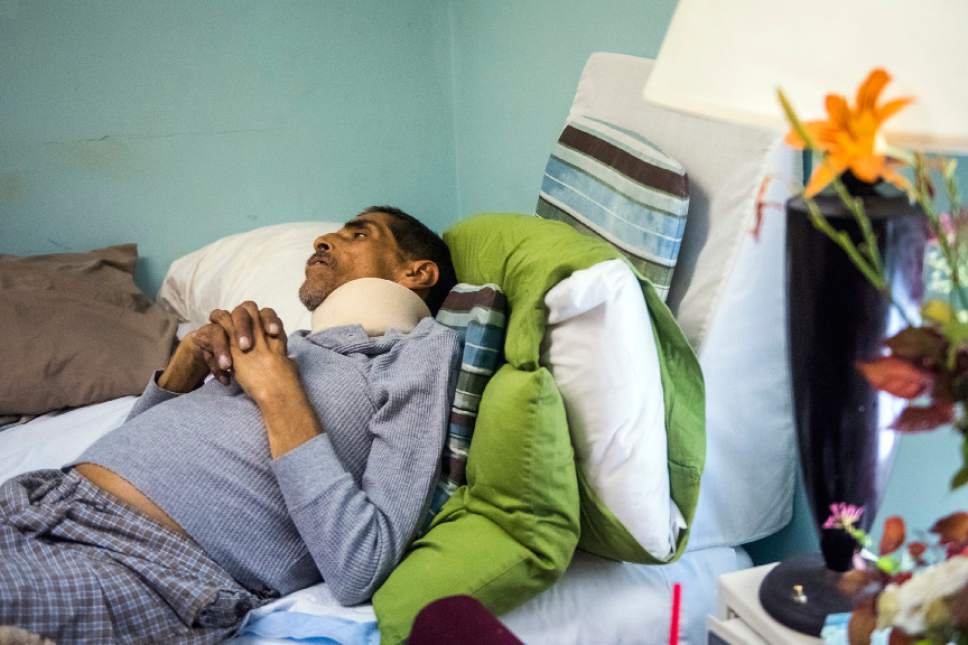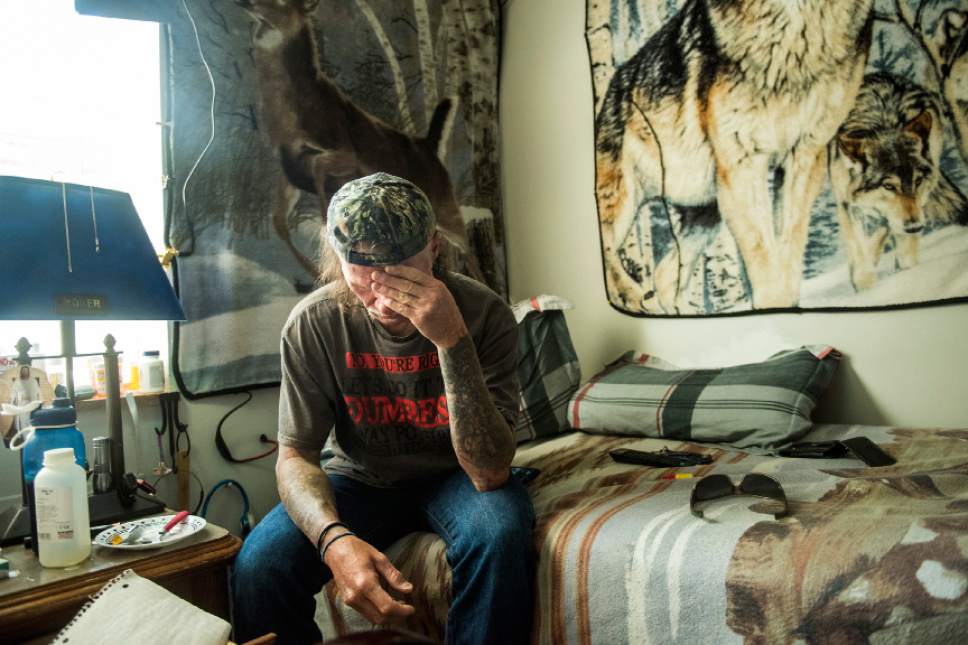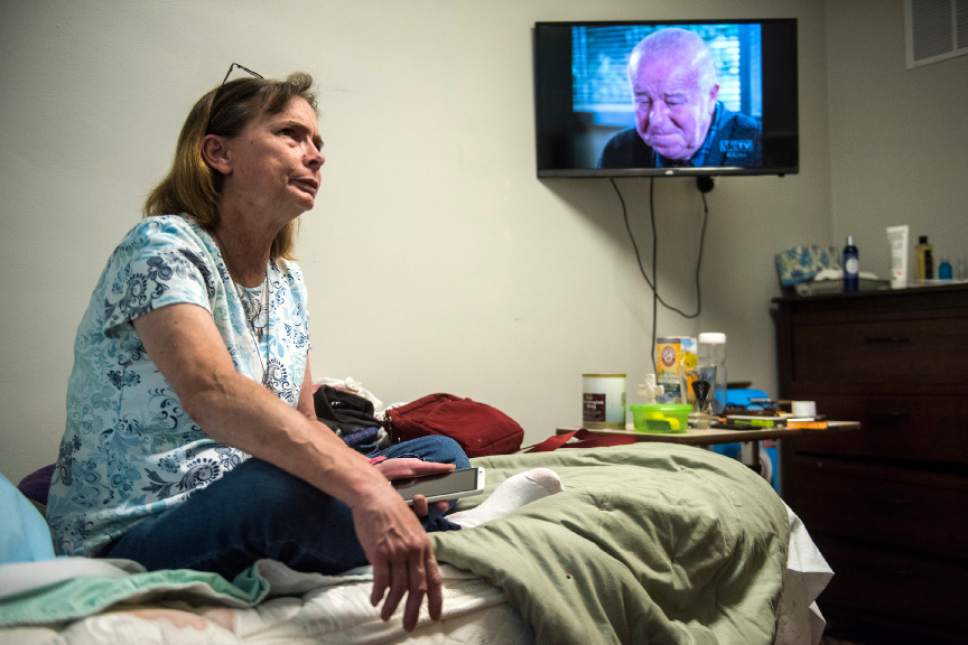This is an archived article that was published on sltrib.com in 2016, and information in the article may be outdated. It is provided only for personal research purposes and may not be reprinted.
Lee Archuletta told his wife, Janice, last week to empty the water-filled milk jugs he was using as weights.
"I think I'm about done," Lee said. He planned to sleep, "but it's going to be a long nap."
Soon after, the 57-year-old was dead. Cancer had stripped every ounce of strength from the man who once prided himself on his toned, muscular body.
Janice cradled Lee in her arms July 1 as he took his last breath at the Inn Between: in a bed with clean sheets, a roof over his head and access to health care.
If not for that organization, Utah's first hospice for the homeless, Lee might have died on the hot, concrete streets of Salt Lake City or in a homeless shelter.
"I love this place," Janice said. Homeless people "can live here and be treated like gold."
In August 2015, the Inn Between opened its doors — and its 16 beds — in the renovated Guadalupe School and former Catholic convent at 340 S. Goshen St. in Salt Lake City. Funded almost entirely through private donations, the center provides food, clothing and health care to the terminally ill and homeless Utahns who live there.
When those individuals die, the organization holds a memorial service and sets families up with a funeral home that offers cremation at a lowered cost.
"We opened with the goal to ensure no one has to die on the streets of Salt Lake City any longer," said Kim Correa, the organization's executive director. "We opened up this home so they could have a dignified end-of-life experience."
—
Complicated lives • The Beatles' "In My Life" trickled through a converted classroom Wednesday at the Inn Between as tissue-clutching men and women settled into mismatched chairs.
Perched upon a table in the room now reserved for memorial services sits a thin binder, opened to Lee's obituary and a photo of Janice and him.
Lee's is the ninth obituary nestled in this binder: the ninth person saved by the Inn Between from dying on the streets or in an overcrowded homeless shelter. The nonprofit holds a memorial service for every person who dies here.
Employees work diligently to find family members so they can say their last goodbyes. These family members often are estranged, Correa said, told by counselors, family and friends to stay away because of the person's mental illness, substance abuse or frequent stints in jail.
But, Correa said, family members almost always attend the services. Lee's was no exception.
About 20 family members and friends came Wednesday to say goodbye to Lee, remembering him as a hard worker, a loving husband, a loyal man.
Until his last days, Lee was the guy who rode shopping carts into displays at grocery stores, laughing as they toppled over; who ate a jalapeño with every meal; who made Janice home-cooked meals while she cleaned houses to make ends meet.
Janice and Lee met at a halfway house, she said, where they both lived after being in prison for drug-related offenses . Their love and marriage of 13 years, Janice said Wednesday, was "wonderful and true."
But Lee and Janice struggled in recent years. He was diagnosed with cancer and broke his neck, she said. Janice had a stroke, she added, and the couple lost their home.
Cancer had taken over Lee's liver, spine and brain stem. The couple had nowhere to go. Then the University of Utah Hospital referred them in May to the Inn Between.
Local hospitals often refer homeless individuals to the Inn Between if they are terminally ill, recognizing they "need a higher level of care than going back on the streets or in a shelter environment," Correa said.
Other organizations also refer people to the Inn Between. Kim Russo, a case manager at Valley Storefront/Safe Haven, referred a client, Troy Rich, there. Rich, who began drinking early in life, had end-stage liver failure.
He died at the Inn Between last month. Russo said the memorial service "was beautiful, and the staff paid homage to a man that endured and lived a complicated life," she said.
Rich lived at the Inn Between for 102 days before he died, Correa said.
Lee lasted just 40.
Though many individuals come to the Inn Between alone and in desperate need of help, the organization sometimes has a terminally ill individual who arrives with his or her spouse, for example. To accommodate couples like Janice and Lee, the organization has several rooms with queen-size beds or double beds.
The spouse often is helpful, Correa said, because he or she can handle a lot of care, such as changing diapers, bathing and feeding.
Now that Lee is gone — his name soon to join the growing list of residents memorialized on an outer brick wall — Janice will have to leave the Inn Between, but she hopes to stay with her cousin in Bountiful.
—
'Going home' • Linda Payne still dreams of owning a small plot of land, perhaps an acre, 85 miles north of Salt Lake City. She'd have cows, chickens and even a gun range.
It's a dream that took shape about 20 years ago, when her frequent trips to Salt Lake City from Oklahoma started.
The Huntsman Cancer Institute, she said, was one of the few places that would treat her disease, which leaves her body riddled with tumors and cysts.
The disease killed two of her sons by the time they reached 25. And it's left Payne, 55, dreaming of owning that land from where she lies in a small bed at the Inn Between.
She never expected to find herself in a place like this.
After years of driving about 18 hours one-way to come to Huntsman, Payne said she sold her Oklahoma home in 2014 with plans of packing her things and moving to Utah. Then, she said, she found herself bracing for multiple surgeries she wasn't expected to survive.
So, she started giving her loved ones the money she made from selling her house, she said. The money for the land, the cows and the chickens disappeared.
Alive and still in need of care from Huntsman, she said she came to Salt Lake City anyway. She spent a lot of time in Sadie, her 2004 Kia Sedona, and later in a homeless shelter.
Payne says she's survived 33 surgeries in her lifetime and beat cancer five times. She jokingly dreams of being reincarnated as a "blond bimbo."
"This life has been rough enough," she said.
Because of her disease, Payne was put on hospice and referred to the Inn Between.
"I'm blessed to be here," she said.
Though Payne doesn't have insurance, she receives her care through Intermountain Homecare and Hospice. Intermountain provides charitable care to an average of four individuals at the Inn Between at any given time, said Daron Crowley, an Intermountain spokesman.
Payne has been doing so well in recent months, she likely will not be recertified for hospice care. If she must leave the Inn Between, she might live with her son in West Virginia. She'll have to find a doctor who can treat her there first.
Regardless of whether she finds a doctor, Payne expects this disease to kill her.
"Death is not a horrible thing," she said. "My sons and I call it going home."
—
Room for more • The converted convent that serves as the Inn Between's main housing area is small. The staircase is narrow and the rooms are tiny.
There is no elevator, so people who cannot walk are sent away if the rooms on the first floor are filled. There are two beds in some rooms, which means a man likely wouldn't use one if a woman was in the other. The same goes for rooms that share a bathroom.
But people still come to fill the beds, and Correa said they even occasionally have a waitlist. She does her best to keep track of the individuals and let them know when a bed opens up.
Correa wants to renovate the old Guadalupe school building, with its childlike paintings of spaceships and horses on the wall, so that it can house an additional 25 beds. The cafeteria and room for memorial services already are in that building.
But to do that renovation, Correa said she needs, at a minimum, $250,000. To do everything she wants, she estimates she needs about $1 million.
The building needs an elevator as well as a fire hydrant out front and upgrades to the fire sprinklers and alarms.
The plumbing is old and the building needs new carpet and paint. There aren't enough bathrooms or showers that comply with the Americans With Disabilities Act.
Correa said the organization has yet to start fundraising for this endeavor; the group just recently had estimates done.
But it's important, she said, because there are more people out there like Archuletta and Rich who deserve to end their life in a comfortable, loving setting.
astuckey@sltrib.com, Twitter@alexdstuckey


